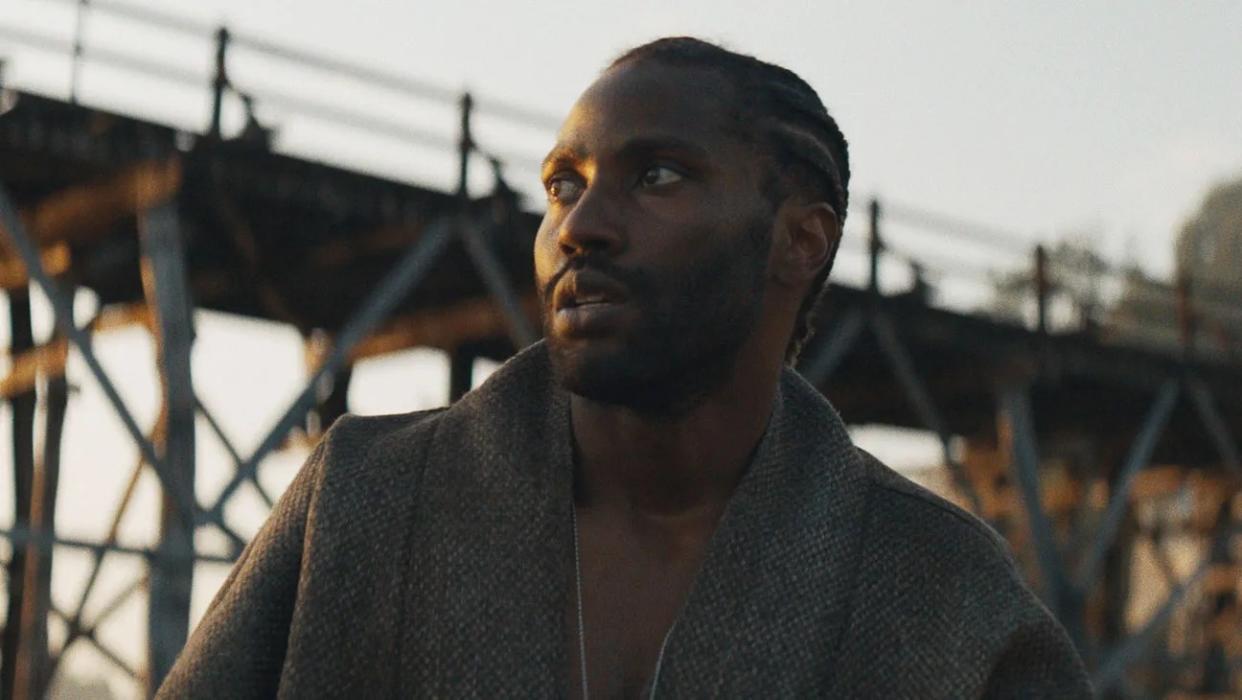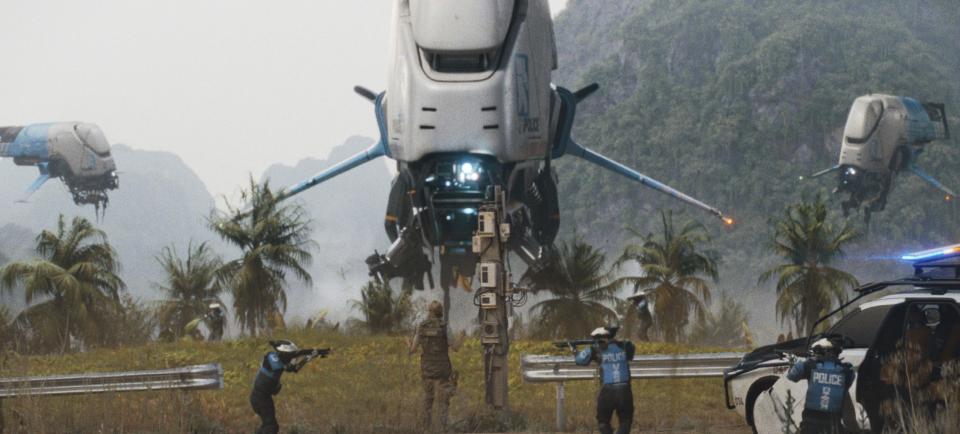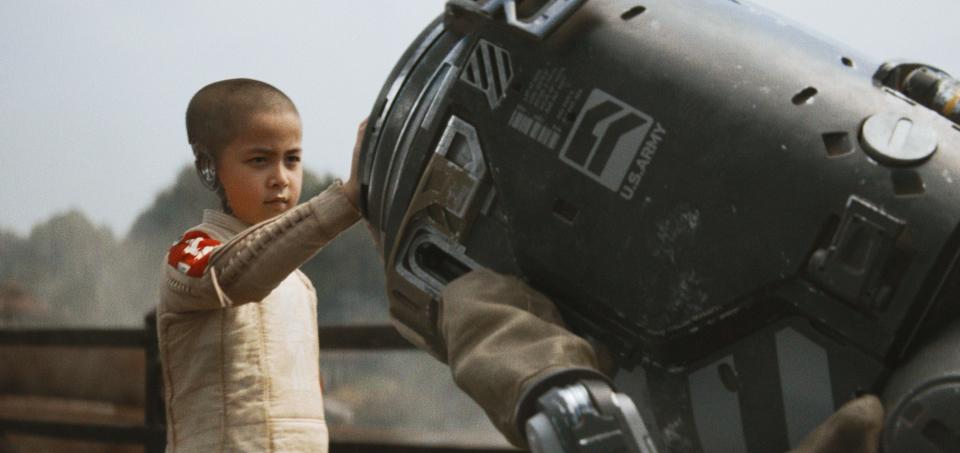‘The Creator’ Review: ‘A.I.’ Meets ‘Children of Men’ in a Sci-Fi Epic That Should Change Hollywood Forever

- Oops!Something went wrong.Please try again later.
- Oops!Something went wrong.Please try again later.
Gareth Edwards’ “The Creator” isn’t an especially good movie, and yet I hope and believe that it has the potential to change the movies forever in some very good ways. The story it tells — about an embittered ex-special forces agent who shepherds the world’s first human/A.I. hybrid child (newcomer Madeleine Yuna Voyles) through a dangerous future, only to rediscover his own humanity in the process — is such an ultra-familiar mishmash of well-worn sci-fi tropes that Edwards’ and Chris Weitz’s script would hardly register as one of the year’s precious few “original” studio projects if not for how it was shot. But good lord is that a big IF.
Once audiences see how “The Creator” was shot, they’ll be begging Hollywood to close the book on blockbuster cinema’s ugliest and least transportive era. And once executives see how much (or how little) “The Creator” was shot for, they’ll be scrambling to make good on that request as fast as they possibly can. Say goodbye to $300 million superhero movies that have been green-screened within an inch of their lives and need to gross the GDP of Grenada just to break even, and say hello — fingers crossed — to a new age of sensibly budgeted multiplex fare that looks worlds better than most of the stuff we’ve been subjected to over the last 20 years while simultaneously freeing studios to spend money on the smaller features that used to keep them afloat. Can you imagine?
More from IndieWire
It might be naive to expect such a radical paradigm shift from an industry that seems hellbent on its own suicide (as Edwards’ main character puts it while refusing the call to re-join the fight against the machines: “I don’t give a shit about being extinct — I’ve got TV to watch”). But 13 years ago, Edwards’ “Monsters” showed the world that consumer tech was capable of cheaply generating Hollywood-grade imagery, and now, “The Creator” is about to show the world that Hollywood-grade tech is capable of cheaply stoking consumer imagination. How ironic that such fresh hope for the future of hand-crafted multiplex entertainment should come from a film so bullish and sanguine at the thought of humanity being replaced by A.I.
“The Creator” is hardly the first recent film that feels like it was written by A.I., but in this case that isn’t (only) because its script is schematic enough to have been generated by ChatGPT. No, “The Creator” feels like it was written by A.I. because — in keeping with the “post-human” energy of Edwards’ magisterial “Godzilla” reboot — its story gradually paints our species as a cancerous blight on a planet that would be much better off if we just bequeathed it to our robot babies.
Unnerving faux-archival footage sets the stage for a grim near-future in which the symbiotic relationship between people and machines was shattered forever when a computer detonated a nuclear bomb in the heart of Los Angeles. Americans responded to the attack in predictably American fashion: By declaring all-out war on artificial intelligence. By proxy, that puts the Western side of the world at war with the East, where flesh and metal continue to coexist in peace. It’s a war the West appears to be on the brink of winning, thanks to a trillion-dollar sub-orbital death ship called NOMAD that hovers in the skies above Vietnam like a titanium Angel — of the “Neon Genesis Evangelion” variety — and uses curtain-like beams of light to target enemies on the ground with pinpoint accuracy. How NOMAD is more effective than any of our current drones remains unclear (whether or not it’s piloted by the same A.I. it exists to exterminate goes similarly unexplored), but it’s “cool” in a terrifyingly colonialist kind of way, and everybody knows that superior military tech guarantees success in a ground war against the people or robots of Vietnam.
But there are other reasons, beyond the obvious and somewhat glib historical parallels, why “The Creator” is set in Vietnam. The first and least important of them is that Vietnam is the last known location of the anonymous programmer Nirmata, the godfather of modern AI and allegedly the architect of a new superweapon capable of destroying NOMAD. Vietnam is where American special agent Joshua (a slow-thawing John David Washington) has been working deep undercover when the story begins; so deep, in fact, that he’s about to have a baby with the woman he was assigned to surveil (Gemma Chan). It’s also where he loses a limb and his budding family alike in the film’s prologue, all of them casualties of a war that he wants nothing to do with when Colonel Howell conscripts him back into it a few years later (she’s played by Allison Janney in a performance that splits the difference between C.J. Cregg and George S. Patton).
The real reason why “The Creator” is set in Vietnam (and across large swaths of Eurasia) is so that it could be shot in Vietnam. And in Thailand. And in Cambodia, Nepal, Indonesia, and several other beautiful countries that are seldom used as backdrops for futuristic science-fiction stories like this one. This movie was born from the visual possibilities of interpolating “Star Wars”-like tech and “Blade Runner”-esque cyber-depression into primordially expressive landscapes. Greig Fraser and Oren Soffer’s dusky and tactile cinematography soaks up every inch of what the Earth has to offer without any concession to motion capture suits or other CGI obstructions, which speaks to the truly revolutionary aspect of this production: Rather than edit the film around its special effects, Edwards reverse-engineered the special effects from a completed edit of his film.

It’s a simple change that was only made possible through mild subterfuge and the invention of lightweight new camera systems, but it had a profound effect on the final picture. Instead of paying a fortune to recreate a flimsy simulacrum of our world on a computer, Edwards was able to shoot the vast majority of his movie on location at a fraction of the price, which lends “The Creator” a palpable sense of place that instantly grounds this story in an emotional truth that only its most derivative moments are able to undo. Long-limbed droids, many of them dressed as farmers or draped in monastic robes, pose over rice paddies in benevolent satisfaction, while android-like A.I.s. — indistinguishable from humans until they turn to reveal a giant metal hole where their ears would be — huddle together in fishing villages while the NOMAD hovers over the tooth-like highlands around them with the divine terror of Dr. Manhattan.
Such details poke holes in the porous border that runs between artifice and reality, and that has an unsurprisingly profound effect on a film so preoccupied with finding ghosts in the shell. Can a robot feel love? Do androids dream of electric sheep? At what point does programming blur into evolution? These aren’t novel questions, and “The Creator” is so convincingly staged that it doesn’t have any compunctions about asking them in wholly un-novel ways (to be perfectly clear: This movie looks fucking incredible. To a degree that shames most blockbusters that cost three times its budget).
Not a single unexpected thing happens from the moment that Joshua discovers that “the ultimate weapon” is a little girl he dubs Alphie, with the possible exceptions of some weirdly cute suicide bomb robots who sprint at their targets on stilted pairs of legs. And the steepness at which the film’s story degenerates from its sui generis start to a finale so empty and generic that it borders on the Blomkampian (just when you think you’ve finally repressed all memory of “Elysium”). Joshua thinks of the A.I. child as scrap, but their bond is galvanized by surviving fraught situations with increasingly high stakes. Then the savagery of his fellow man convinces our hero that Alphie might just be more human than human. That’s about all there is to it, and separating the story into discrete chapters — complete with title cards written in Japanese for some reason — does little to disguise its simplicity.

It’s the most basic arc that someone could bend from this premise, and “The Creator” fails to meaningfully complicate it or add new wrinkles to Joshua’s moral awakening. A brief catch-up with one of his old soldier buddies (Sturgill Simpson) is tasked with accomplishing both of those things, only to fall back on world-building in a film that already has enough of the stuff to fill a franchise, but never achieves the character detail required to thread the needle between “I, Robot” and “Children of Men.”
Washington embraces the challenge of chipping away at his even-keeled screen presence, but Joshua’s arc is so prescriptively coded that the actor playing him only has a few moments to explore a fuller extent of his humanity (and none of them happen until long after the film around him has surrendered to spectacle). Voyles is adorable, and brings real integrity to a performance that most kids would have made cloying, but Alphie’s programmatic innocence — typical of a story in which all of the most advanced A.I. characters are holy beings of wisdom and light — makes it difficult to share in the love that Joseph develops for her. Even and especially when “The Creator” stretches the bounds of credulity to forge that connection, Alphie remains more of a plot device than a person.
And yet “The Creator” — like “Godzilla” before it, and even “Rogue One” to a certain extent — is redeemed by the pyrrhic victories of Edwards’ post-human vision as much as it’s lifted by the majesty of his forward-thinking technique. Yes, it helps that the director has a classic eye for staging action, that he gives his movies room to breathe, and that he knows that the perfect “Kid A” needle-drop (the album, not the song) can do more for a story about the next iteration of “human” life than any of the tracks from Hans Zimmer’s score.
But the most fundamental reason why “The Creator,” for all of its shortcomings and clichés, ultimately sold me on its optimism is that it succeeds as a blueprint where it fails as a movie. At a time when A.I. is stoking “Terminator”-fueled nuclear paranoia, further diluting the possibility of shared facts, and hastening the heartlessness of capitalism in the digital age, there’s some real cognitive dissonance to seeing a film that effectively asks us to root for a cuter version of ChatGPT. But Edwards and Weitz’s script is fascinating for its take on a future in which people have programmed A.I. to maintain the compassion that our own species has lost somewhere along the way; a future in which technology might be a vessel for humanity rather than a replacement for it; a future in which computers might complement our movies rather than replace our cameras.
Grade: B-
20th Century Studios will release “The Creator” in theaters on Friday, September 29.
Best of IndieWire
Sign up for Indiewire's Newsletter. For the latest news, follow us on Facebook, Twitter, and Instagram.

